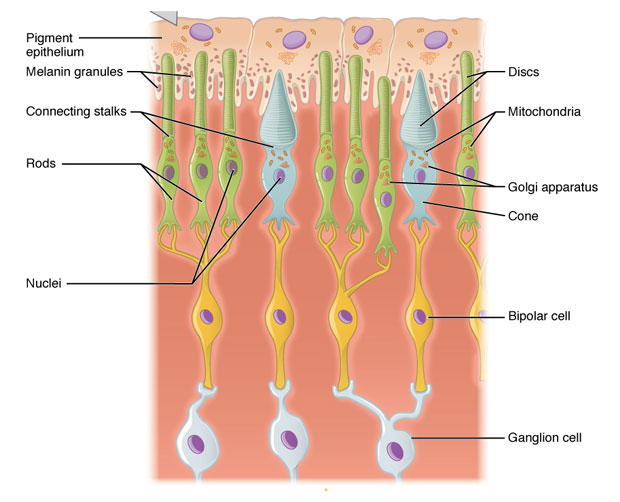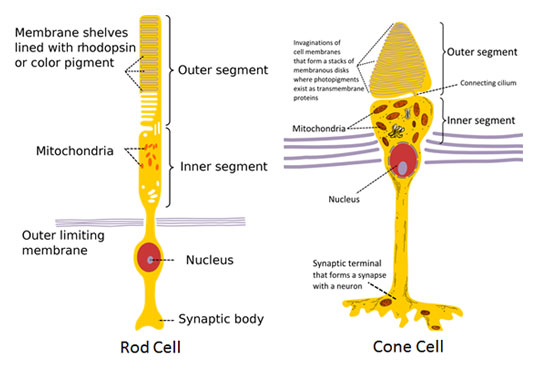Rods vs Cones
Rods vs Cones : Rod cells and Cone cells are the two types of photoreceptor cells found in the retina of eyes. These cells are capable of absorbing light and converting the light into signals that can trigger a change in the membrane potential, which results in visual phototransduction. In other words, these cells assist in vision in presence of light.
Rod cells: A type of photoreceptor cells in the eye found concentrated at the outer edges of the retina. Rod cells are responsible for vision in low light conditions.
Cone cells: The second type of photoreceptor cell in the eye concentrated in the fovea of the retina. Cone cells are responsible for the vision in bright light and colour vision.

image source: wikipedia
The present post explains the similarities and differences between Rod cells and Cone cells with a comparison table.
Similarities between Rods and Cones
Ø Both rods and cones are photoreceptor cells of the eye.
Ø Both can absorb photon (light)
Ø Both cells possess photoreceptor proteins to absorb the photons (light).
Ø Both are modified nerve cells.
Ø Both rods and cones synapse with bipolar cells.
Ø The chemical process that supports phototransduction is similar in both cells.
Ø The outer segments of both cells possess membrane invaginations that contain the light absorbing pigments.
Difference between Rods and Cones
Sl. No. Rod Cells Cone Cells
1 Rod cells are located at the peripheral portion of the retina. Cone cells are located at the central part (fovea) of the retina
2 Rod cells are cylindrical and comparatively longer than cone cells Cone cells are comparatively shorter than rod cells
3 Rod cells are narrower than cone cells Cone cells are usually wider than rod cells
4 More number of rod cells than cone cells Number of cone cells are lesser than that or rod cells
5 Average number of rods in human is 120 million Average number of cones in human is 6 million
6 Rod cells are extremely sensitive to low levels of light Cone cells are very slow sensitive to low light. Cone cells are very sensitive to bright light
7 Rod cells can be triggered even by a single photon of light Large number of protons is required to trigger the cone cells
8 Rod cells help in scotopic vision (low light vision) and night vision Cone cells help in photopic vision (high light vision) daylight vision
9 Only one type of visual pigment is present in rod cells Three different types of visual pigments present in cone cells
10 Rod cells possess very rapid regenerative power The regenerative power of cone cells is very less
11 In human, only a single type of rod cell is present In human, three distinct types of cone cells are present based on their pattern of response to different wavelength of light
12 The outer segment of rod cell is cylindrical and contains the pigment rhodopsin The outer segment of cone cell is cone shaped and contains the pigment photopsin
13 Only one type of rhodopsin is present in rod cells Three different types of photopsin, which respond differently with different wavelength of light (blue, green and red), are present in cone cells to enable the colour vision
14 Rod cells are sensitive to scattered and direct light Cone cells are sensitive only to direct light
15 The visual acuity of rod cells is less The visual acuity of cone cells is high
16 Rod cells are absent in fovea Cone cells are concentrated in the fovea
17 Loss of rod cells causes night blindness Loss of cone cells causes legal blindness

# Three types of photoreceptor cells in mammalian retina: rod cells, cone cells and photosensitive retinal ganglion cells.
Learn more: Difference between Sympathetic and Parasympathetic Nervous System
<< Back to Human Physiology Notes
More Lecture Notes from Easy Biology Class…
BotanyZoologyBiochemistryGeneticsCell & Molecular BiologyBiotechnologyPhysiology & EndocrinologyPlant PhysiologyMicrobiologyImmunologyEmbryologyEcologyEvolutionBiophysicsResearch MethodologyBiostatisticsChemistry for BiologistsPhysics for Biologists

